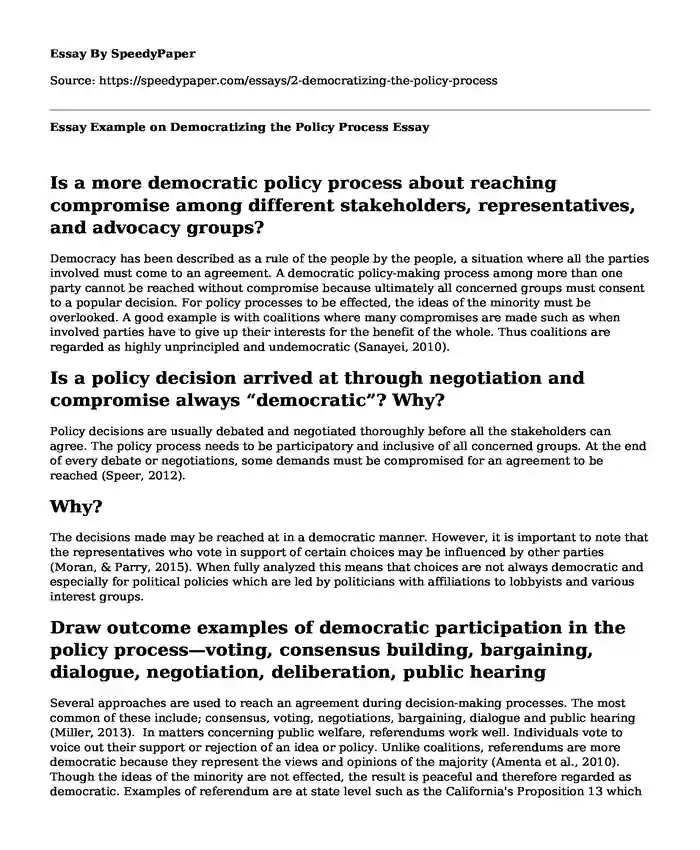
| Type of paper: | Essay |
| Categories: | Political science Democracy Society Policy analysis |
| Pages: | 3 |
| Wordcount: | 630 words |
Is a more democratic policy process about reaching compromise among different stakeholders, representatives, and advocacy groups?
Democracy has been described as a rule of the people by the people, a situation where all the parties involved must come to an agreement. A democratic policy-making process among more than one party cannot be reached without compromise because ultimately all concerned groups must consent to a popular decision. For policy processes to be effected, the ideas of the minority must be overlooked. A good example is with coalitions where many compromises are made such as when involved parties have to give up their interests for the benefit of the whole. Thus coalitions are regarded as highly unprincipled and undemocratic (Sanayei, 2010).
Is a policy decision arrived at through negotiation and compromise always “democratic”? Why?
Policy decisions are usually debated and negotiated thoroughly before all the stakeholders can agree. The policy process needs to be participatory and inclusive of all concerned groups. At the end of every debate or negotiations, some demands must be compromised for an agreement to be reached (Speer, 2012).
Why?
The decisions made may be reached at in a democratic manner. However, it is important to note that the representatives who vote in support of certain choices may be influenced by other parties (Moran, & Parry, 2015). When fully analyzed this means that choices are not always democratic and especially for political policies which are led by politicians with affiliations to lobbyists and various interest groups.
Draw outcome examples of democratic participation in the policy process—voting, consensus building, bargaining, dialogue, negotiation, deliberation, public hearing
Several approaches are used to reach an agreement during decision-making processes. The most common of these include; consensus, voting, negotiations, bargaining, dialogue and public hearing (Miller, 2013). In matters concerning public welfare, referendums work well. Individuals vote to voice out their support or rejection of an idea or policy. Unlike coalitions, referendums are more democratic because they represent the views and opinions of the majority (Amenta et al., 2010). Though the ideas of the minority are not effected, the result is peaceful and therefore regarded as democratic. Examples of referendum are at state level such as the California's Proposition 13 which resulted to drawbacks in property taxes.
Make sure to provide an example (preferably from your area of practice or research = Black Women in White male dominate Fields) of a policy compromise resulting from an ostensibly democratic process that ended up excluding and marginalizing large groups and their interests
In a different approach, one can analyze the plight of women especially black women in male (white) dominated fields. The women are discriminated against; they do not get ample opportunity to speak on issues affecting them, and so they have to rely on the goodwill of the males to get heard. They have to struggle to advocate for salary increment or job promotion. Black women work twice as much as their white colleagues only to earn half their wages (Cooper, 2016). Incidents like these need economic policies that are democratic and inclusive of all parties regardless of their gender and race.
References
Amenta, E., Caren, N., Chiarello, E., & Su, Y. (2010). The political consequences of social movements. Annual Review of Sociology, 36, 287-307.
Cooper, B. (2016). But some of us are brave: Black women's studies. P. Bell-Scott, & B. Smith (Eds.). The Feminist Press at CUNY.
Miller, J. D. (2013). The American people and science policy: The role of public attitudes in the policy process. Elsevier.
Moran, M., & Parry, G. (2015). Democracy and democratization. Routledge.
Sanayei, A., Mousavi, S. F., & Yazdankhah, A. (2010). Group decision-making process for supplier selection with VIKOR under fuzzy environment. Expert Systems with Applications, 37(1), 24-30.
Speer, J. (2012). Participatory governance reform: a good strategy for increasing government responsiveness and improving public services?. World Development, 40(12), 2379-2398.
Cite this page
Essay Example on Democratizing the Policy Process. (2017, Oct 31). Retrieved from https://speedypaper.com/essays/2-democratizing-the-policy-process
Request Removal
If you are the original author of this essay and no longer wish to have it published on the SpeedyPaper website, please click below to request its removal:
- Essay Sample with History Articles Comparison
- Report for a Marketing Manager, Essay Example
- Free Essay Example: Nora the Town Girl
- Free Essay: Fathers' and Siblings' Responses to Disabled Family Members
- Alcohol Screening Case Study, Free Paper for Your Inspiration
- German Expressionism and Editing Meanings in Alfred Hitchcock's Psycho and The Birds: Essay Sample
- Free Essay on Decline/Death Phase- Exponential Decrease in the Number of Bacteria Living Cells.
Popular categories




